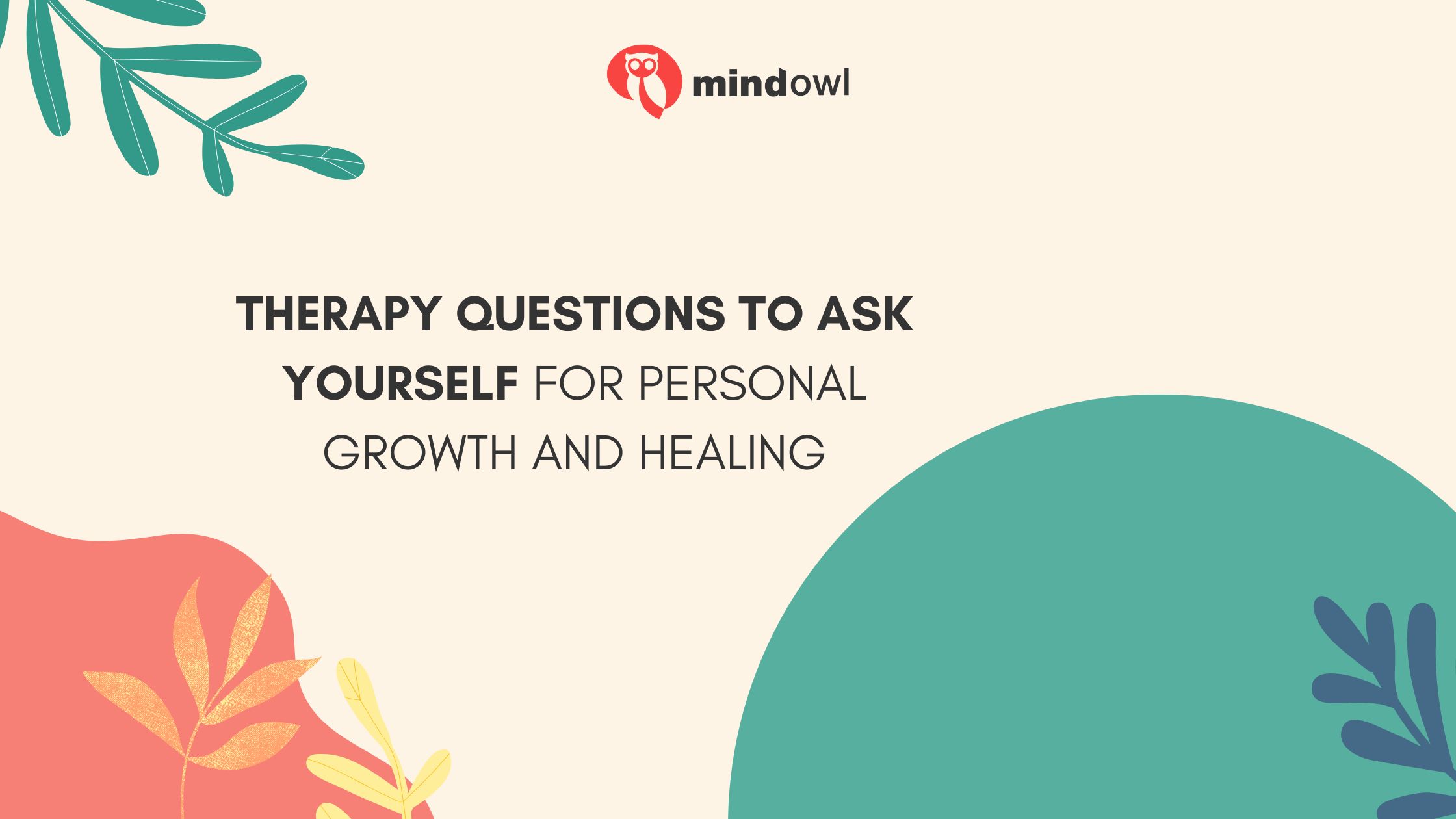
Feeling stuck or lost is a part of life we all face at times. Reflective questioning can be a powerful tool to navigate through these phases, promoting self-awareness and healing. This article will explore essential therapy questions that guide you towards personal growth and provide the push needed for inner transformation.
Discover your path to clarity and empowerment as we delve into meaningful self-inquiry.
Key Takeaways
- Self-therapy involves asking deep questions to understand thoughts and feelings, leading to self-awareness and personal growth.
- Regularly examining emotions helps manage mental health, improves communication with others, and encourages positive life changes.
- Reflecting on relationships helps assess connection levels with others and the effectiveness of communication with loved ones.
- Considering career motivations and satisfaction can guide professional development aligned with personal values for a fulfilling path.
- Addressing physical health through self-care habits like exercise, balanced diet, and stress management contributes to overall well-being.
What is Self-Therapy?

Self-therapy is a powerful process of growth and healing that you can do on your own. It uses questions to dig deep into thoughts and emotions. This helps you understand yourself better and make positive changes.
You reflect on life’s challenges and consider different ways to overcome them. Self-therapy encourages self-awareness, which is key for personal development.
It guides you through steps often found in a therapy session but at your speed, without a therapist present. You may use tools like journals or CBT worksheets to explore feelings in-depth.
Focusing on mental health, relationships, career, or physical wellness is all part of self-therapy. Each question leads toward clarity and well-being with the goal of empowering change from within.
The Benefits of Asking Yourself Therapy Questions

Asking yourself therapy questions can lead to personal growth, self-awareness, and emotional healing. It allows you to examine your thoughts and emotions, gain clarity on recurring issues, and work towards positive changes in various aspects of your life.
Personal growth
Exploring therapy questions can spark your journey to personal growth. Through self-reflection, you unlock a deeper understanding of who you are and what drives you. This process fosters increased self-awareness, empowering you to make decisions that align with your core values.
Engaging in this introspective practice enhances not only your emotional well-being but also improves communication skills and empathy towards others.
Personal development questions guide you towards recognising areas for improvement and uncovering strengths. By considering what is holding back progress on your goals or identifying recurring life issues, subtle shifts begin to occur within.
Embracing these insights leads to transformational change, strengthening self-esteem and emotional self-regulation on the path to healing and growth. Keep asking thoughtful questions; they motivate action in all aspects of life—leading to enhanced overall well-being.
Self-awareness
Self-awareness helps you understand your own mind. You see what you think, feel, and do more clearly. This understanding is key to change and healing. Knowing yourself lets you spot patterns in your behavior.
Are some actions helping or hurting? Self-awareness can help answer that.
Seeing how emotions drive your decisions is powerful. You learn to handle feelings better and express them well. Students benefit from self-awareness too. It shapes their learning, relationships, and choices in life.
Use questions to explore deep within yourself for personal growth and better mental health.
Emotional healing
Emotional healing often starts with a simple question. It helps break down the walls of numbness and allows feelings to flow again. Working through emotions can be tough, but asking questions guides you on a journey of understanding and recovery.
These prompts dig deep into your heart and mind. They help heal old wounds by shedding light on pain points.
Questions challenge negative thoughts that may hold you back from feeling whole. This process also improves empathy towards yourself and others, making communication clearer. Self-questioning fosters emotional self-regulation, paving the way for personal growth in many areas of life.
Therapy Questions for Mental Health
Therapy Questions for Personal Growth and Healing
Ask yourself: What is standing between you and your biggest goals? How have you been feeling lately? Who can you turn to for unbiased support? What recurring issues have been causing you distress? What choices have been weighing on your mind? Dive deeper into these questions to uncover insights about yourself and start your journey to personal growth and healing.
What is standing between you and your biggest goals?
Fear and doubt often stand in the way of reaching our biggest goals. You might feel stuck because you believe you’re not good enough or that your dreams are too far-fetched. Sometimes, past failures keep you from trying again, or maybe it’s just hard to know where to start.
Look closely at what holds you back—be honest with yourself about these barriers.
Taking small steps can lead to big progress. Make a plan and break it down into parts that feel less intimidating. Celebrate every little victory along the way to boost your confidence.
Remember, understanding your obstacles is the first step toward overcoming them and moving closer to success.
Now, let’s turn inward and consider how you’ve been feeling lately.
How have you been feeling lately?
Lately, your feelings might have been all over the place. You could be happy one moment and sad the next. This is common and shows you’re human with a range of emotions. Taking time to think about how you’ve been feeling helps you understand yourself better.
It’s part of self-reflection that leads to personal growth.
Your moods can change for many reasons. Maybe it’s stress from work or problems at home. By noticing your emotions, you learn about what triggers them. Think about the things that make you feel good too, not just the bad stuff! Understanding your feelings is a big step in emotional healing.
Now let’s consider who offers you support during tough times.
Who can you turn to for unbiased support?
Finding someone who gives unbiased support is key to personal growth. Therapy and life coaching are great places to look for this kind of help. A therapist or coach listens without judging you.
They won’t project their own ideas onto your situation. Instead, they focus on helping you discover your true feelings and thoughts.
Talk to friends or family members who can be open-minded and give honest feedback. Still, keep in mind that sometimes those close to us might have their own views that shape the advice they give.
That’s why professional support often works best for self-discovery and healing, as it comes with no strings attached.
What recurring issues have been causing you distress?
Recurring distress may stem from underlying trauma and lead to mental health challenges like substance use or suicidal thoughts. It’s essential to address these issues through therapy questions that prompt self-reflection and understanding.
By analysing your sources of stress and emotions, you can identify patterns and work towards healing in a structured and insightful manner, ultimately leading to positive life changes.
What choices have been weighing on your mind?
Consider the choices standing between you and your biggest goals. Evaluate how they align with your values to chart a path for personal growth. Reflect on recurring issues causing distress and seek unbiased support to navigate through them effectively.
Therapy Questions for Mental Health
How are you feeling today? What are your current sources of stress? What positive changes do you want to make in your life? How do you cope with difficult emotions? If you’re interested in exploring more therapy questions for mental health, keep reading for valuable insights and guidance on personal growth and healing.
How are you feeling today?
Take a moment to check in on your mental well-being. Assess your emotions and acknowledge how you are feeling today. Your emotional health plays a significant role in your overall wellness, so it’s important to give yourself the space to recognise and address any concerns or struggles you may be experiencing.
Regularly checking in with yourself is an essential part of self-care, promoting self-awareness and emotional resilience, which are vital for personal growth and healing.
Reflecting on your feelings can help identify areas that need attention or support. By acknowledging how you feel today, you empower yourself to take proactive steps towards maintaining a healthy mindset and seeking the support or resources you may need for your well-being.
What are your current sources of stress?
Identify your current sources of stress. Check in on your mental wellness. Stress negatively impacts well-being.
Take a moment to reflect and self-assess. Evaluate feelings such as stress, anxiety, worry, and sadness. Stress can lead to further sources of stress.
Move forward with addressing these elements affecting your mental health as we delve into therapy questions for personal growth and healing.
What positive changes do you want to make in your life?
Identify the positive changes you strive towards. Motivation plays a crucial role in initiating and sustaining these changes. Therapists often explore clients’ aspirations for change to guide their therapeutic process effectively.
Motivational interviewing, a counselling style emphasising client engagement, aids in fostering positive transformations by promoting motivation and self-discovery. Engaging with therapy questions that focus on personal growth, emotional healing, and self-awareness can ignite the drive for change and intentional living.
How do you cope with difficult emotions?
Managing challenging emotions is crucial for maintaining mental wellbeing. Taking time to acknowledge and understand how you are feeling can provide insight into your emotional state, enabling you to address stress, anxiety, or other negative emotions effectively.
Recognising these feelings allows you to seek appropriate support and strategies that promote positive coping mechanisms. It’s important to remember that seeking professional help should not be overlooked when experiencing overwhelming emotions.
Understanding and managing difficult emotions can significantly impact your overall emotional, psychological, and social well-being. Being aware of the subtle signs of stress or unease enables you to take proactive steps towards fostering a healthier mindset and emotional resilience.
Therapy Questions for Relationships
How would you describe your relationship with yourself? How connected do you feel to the people around you? How do you communicate with loved ones? These are important questions to consider for personal growth and healing in relationships.
How would you describe your relationship with yourself?
Your relationship with yourself deeply influences personal growth and emotional healing. Self-reflection questions like, “What choices have been weighing on your mind?” can help you identify areas for improvement while fostering self-awareness and cognitive wellness.
It’s crucial to prioritise self-care and understanding to pave the way for positive changes in every aspect of your life.
Therapy questions encourage individuals to analyse their mental, emotional, physical health, as well as relationships and career goals. By asking questions such as “How are you feeling today?” or “What motivates you in your career?”, individuals can gain insights that lead to impactful transformation and empowerment.
How connected do you feel to the people around you?
Considering the important impact of relationships on one’s mental and emotional health, it is crucial to assess your sense of connection with those around you. Strong relationships have been shown to positively affect overall well-being and lower rates of anxiety and depression, making it essential to reflect on the quality of your connections with others.
Studies indicate that a sense of closeness and belongingness derived from human connection can significantly contribute to personal growth and healing, underscoring the significance of evaluating how connected you feel to the people in your life.
How do you communicate with loved ones?
To strengthen communication with loved ones, using open and honest dialogue is crucial. Engage in active listening to truly understand their perspectives and feelings. Express appreciation for their presence and be mindful of non-verbal cues as well.
Remember that effective communication involves respecting each other’s viewpoints while being empathetic towards one another’s emotions.
Building a strong foundation of trust through open conversations can foster deeper connections with loved ones, promoting understanding and empathy within relationships. It’s essential to create a safe space where both parties feel comfortable expressing themselves openly without fear of judgment or misunderstandings.
Therapy Questions for Career Goals
What motivates you in your career? Are you satisfied with your current job or career path? What are your long-term career goals? Dive into these questions to gain clarity and direction in your professional life.
Read more for insightful therapy questions that can help guide you towards personal growth and healing.
What motivates you in your career?
Reflecting on what motivates us in our careers is crucial for personal and professional growth. Understanding our driving forces helps align our work with our values, leading to a more fulfilling journey.
Additionally, exploring these motivations can also uncover areas where we seek personal growth and healing, contributing to a deeper understanding of our career aspirations and objectives.
Are you satisfied with your current job or career path?
Reflect on your job satisfaction. Evaluate if your current career aligns with your long-term goals. Consider how satisfied you feel at work and assess the impact it has on your overall wellbeing.
Uncover factors contributing to any feelings of dissatisfaction, and reflect on potential pathways for improvement. What motivates you in your career? Are you experiencing any physical symptoms of stress? How do you cope with difficult emotions? Make time to ponder these queries as they can offer valuable insights into enhancing fulfillment in your professional journey.
Is there room for growth?
What are your long-term career goals?
Your long-term career goals should be specific, measurable, achievable, relevant, and time-bound (SMART). When asked about your long-term career goals in a job interview, it’s essential to start with short-term goals.
Be specific in your response and focus on how these goals align with the role you are applying for.
Therapy Questions for Physical Health
How do you take care of your body? Are you experiencing any physical symptoms of stress? What healthy habits do you want to develop? These therapy questions for physical health will help guide you towards a healthier and more balanced lifestyle.
How do you take care of your body?
Taking care of your body is crucial for overall well-being. It involves regular exercise, getting enough sleep, and eating a balanced diet to maintain physical health. Additionally, managing stress levels and addressing any physical symptoms promptly are essential aspects of self-care.
Remembering the importance of self-care helps in preventing burnout and contributes to living a fulfilling life. Incorporating these practices into your daily routine can lead to better long-term health outcomes and an improved sense of well-being.
Are you experiencing any physical symptoms of stress?
Physical symptoms of stress can include headaches, body pains, and skin rashes. Chronic stress may worsen existing health conditions like diabetes, asthma, cancer, or cardiovascular disease.
Stress is a normal response to new situations but identifying problematic responses is crucial. It’s important to differentiate between normal and problematic stress responses related to physical symptoms since they can impact overall well-being.
Depression has been linked to various chronic illnesses such as arthritis and can cause feelings of agitation, restlessness, sleep disturbances and pain. Understanding the connection between mental health and physical symptoms plays an essential role in managing overall health.
What healthy habits do you want to develop?
Are you experiencing any physical symptoms of stress? It’s important to prioritise healthy habits that foster physical wellness. Incorporating regular exercise, nutritious eating, and sufficient sleep are vital for both physical and mental health.
These simple but impactful changes can contribute to an overall sense of well-being and play a significant role in enhancing your quality of life.
Fostering healthy lifestyle activities such as mindfulness practices or relaxation techniques can also aid in managing stress, promoting emotional balance, and improving your overall health.
Conclusion
In conclusion, self-therapy questions are powerful tools for personal growth and healing. By asking ourselves important questions, we can gain valuable insights and foster self-awareness.
These questions guide us towards positive change and empower us to navigate life’s challenges with resilience. Embracing introspection through therapy questions can lead to profound self-discovery and emotional healing, ultimately enriching our lives.
FAQs
1. What kind of questions can help me grow personally?
Questions to ask yourself for personal growth might include those that challenge your negative thinking, explore how you perceive others, or examine behaviours that don’t serve your well-being.
2. How do self-reflection exercises for free aid healing?
Journal writing and meditation are examples of self-reflection exercises you can access for free. They encourage introspection, helping to understand your subconscious mind and trigger a breakthrough in personal healing.
3. Can journaling really make a difference in my social life?
Yes, journaling invites you to analyse the relevant aspects of your interactions which could give you tools to improve how you relate with people from different perspectives.
4. Are there specific science-based exercises I can try?
There definitely are! Exercises like guided meditation or targeted journal prompts equip you with structured methods to learn something new about yourself and work through issues such as self-compassion or behavioural patterns.
5. Should I see a therapist if I want to change things in my life?
If your own efforts aren’t enough or if pathology such as autism is involved, it’s worth considering professional help where therapy provides structure and expertise for deep change.
6. What should I keep in mind when asking myself tough questions?
When engaging with questions that go deep into personal growth and healing, remember it’s important to maintain self-compassion; taking too harsh an approach could lead down the wrong way instead of towards healing.
MindOwl Founder – My own struggles in life have led me to this path of understanding the human condition. I graduated with a bachelor’s degree in philosophy before completing a master’s degree in psychology at Regent’s University London. I then completed a postgraduate diploma in philosophical counselling before being trained in ACT (Acceptance and commitment therapy).
I’ve spent the last eight years studying the encounter of meditative practices with modern psychology.

